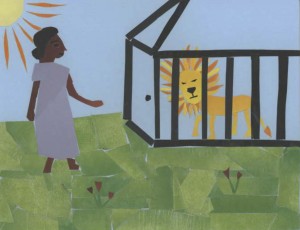“’How can you trust those untrained men out of doors?’
‘We have no hand or voice in the management of our social affairs. In India man is lord and master. He has taken to himself all powers and privileges and shut up the women in the zenana.’
‘Why do you allow yourselves to be shut up?’
‘Because it cannot be helped as they are stronger than women.’
‘A lion is stronger than a man, but it does not enable him to dominate the human race.’”
– Rokeya Sakhawat Hossain, Sultana’s Dream
Rokeya’s story Sultana’s Dream pushes back against the tradition of purdah, in which women in some Muslim (as well as some other) communities are restricted from interacting with men in a number of ways, such as by wearing the veil and by staying only in certain areas of the home (called the zenana). Rokeya describes a fictional world called Ladyland, where purdah laws are reversed and men must remain indoors while women are free to come and go as they please, without having to cover themselves with any form of veil. Rokeya makes Ladyland into almost a utopia: there is no crime, technology makes everything easier, and the streets are made up of moss and flowers. The main point of Rokeya’s story, and the quote above in particular, is that purdah restricts women in unfair ways, and women need to stand up for themselves if they want to have more rights in their communities.
I particularly enjoyed the parts of Sultana’s Dream that referred to men as beasts, because, to me at least, purdah laws seem to treat them as such. Purdah only seems to restrict the ways in which women act around men, rather than around other women, and the laws are justified on the basis of the effect women have on men. Coming from my perspective as an outsider to purdah laws, this seemed like an unrealistic depiction of men as powerless to their own impulses (much like how we view the behavior of wild animals) and also put unnecessary burden on women to change their behavior as a result of men’s wild tendencies. As a result, I liked how Rokeya drew a parallel between man and lion and argued that if men have such terrible impulses then they should be the ones whose freedoms are restricted.
I decided to illustrate this argument with a collage. I made the background a light blue, with a shining sun and green grass and flowers to reflect the utopic nature of Ladyland. The lion, as from the quote above, represents men and their wild tendencies and physical strength. Yet despite that daunting strength, in Ladyland women are able to contain the lions, so the lion in the collage is behind bars, which themselves are part of a house, reflecting how purdah laws that keep women from leaving the home acts as a kind of cage, restricting their freedom. I made the woman’s head uncovered, since in Ladyland there is no need for women to follow purdah laws. I also made her larger than the door to the house, because the women in Ladyland, having stood up for their rights (as Rokeya is encouraging in the story), cannot be contained. I also had the woman reaching her hand out to the lion, since in reality Rokeya was not actually advocating for a reversal of purdah laws, but rather for a more equal society in which both men and women share the same rights.
